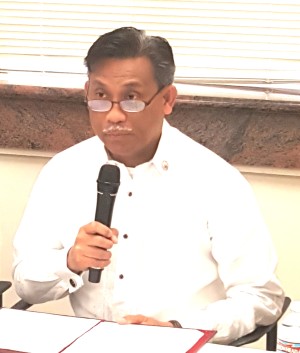
Philippine Consul General to San Francisco Henry Bensurto Jr. heads up the Department of Foreign Affairs’ legal panel in the Philippine claim against China before the International Tribunal for the Law of the Sea (ITLOS). JUN NUCUM
SAN FRANCISCO — Call him an eternal optimist, a consummate diplomat or both, Philippine Consul General to San Francisco Henry Bensurto, Jr., believes that despite its brash threats, China respects international law and will abide by a United Nations tribunal ruling on the South China/ West Philippine Sea conflict.
READ: #InquirerSeven FAQ about the Philippines vs. China arbitration case
Bensurto heads up the Department of Foreign Affairs’ legal panel in the Philippine claim against China before the International Tribunal for the Law of the Sea (ITLOS) of the United Nations Convention on the Law of the Sea.
He expressed optimism in an INQUIRER.net interview ahead of the ruling from the Tribunal expected this week.
“Rule of law is international law not interpreted by China unilaterally, but law as interpreted by a third party adjudicatory body fully subscribed to by all parties including China, which is the United Nation Convention on the Law of the Sea (UNCLOS), from which law this Tribunal was constituted and which was ratified also by China and the Philippines,” Bensurto explained.
Higher good
“We also hope that China will see the higher good beyond its own unilateral interest, in terms of community living, because rule of international law is the tie that binds us all in the community of nations,” Bensurto said further.
“And it is in the interest of each and every component of that community to fully subscribe to that law. If we are going to take away the rule of law, the community will crumble, unravel and fall into anarchy and chaos and this is not in the interest of all countries including China for that matter,” he added.
READ: UNCLOS explained: Why China’s claims in South China Sea are invalid
Along this line, Bensurto hoped that China would follow the footsteps of another great power, India, citing the latter’s lost case against Bangladesh, which was awarded 19,467 square kilometers of the total 25,602 sq. km. disputed area in the Bay Bengal by the Permanent Court of Arbitration (PCA) based in The Hague. That case took nearly five years before a decision was reached.
India’s example
“India took a path consistent with the true good member of the community and had the humility to accept its loss and is now implementing the ruling against it for the betterment of both countries. That is not only benefiting Bangladesh, but is also benefiting India,” Bensurto explained. “We hope and we pray that China as great a nation as it is would take the humility of leadership as well,” Bensurto added.
Bensurto also shared that the Tribunal has all the facts and information that it needed to make the decision. The Tribunal finished hearing the merits and the substance of the case on November 2015, giving it more than six months for a decision.
READ: China: We are the victims in dispute; won’t heed UN decision
“Obviously the time frame has been affected by the fact that Taiwan, at the last minute after the close of the proceedings last November, came out with its own position January this year. That must have also figured in the equation of the Tribunal, which would not want any stone left unturned,” Bensurto divulged.
Taiwan’s position
The position of Taiwan is that Itu Aba is not a rock but an island that should be able to project 200 nautical miles, which the Philippines disagrees with and has submitted evidence to the contrary. The position of the Philippines is that Itu Aba, like any other fixtures in the Spratlys, does not really constitute an island that could project 200 nautical miles.
“(The Tribunal) even asked the Philippine government to comment on the write-ups, publications and articulations of the Taiwanese government including its effort to be heard and file an amicus brief before the Tribunal — there is really nothing new in terms of what it has articulated that is different from what the Chinese have said before about Itu Aba,” he explained.
Bensurto also sees no deviation in the Philippines’ position under the new President Rodrigo Duterte.
Bensurto recalled that President Duterte made a statement that he would rather wait and be bound by the decision of the Tribunal. “Obviously the new administration will have its own discretion on how to proceed with this case. Judging from how the president has articulated, it is very clear that he will stand all the time for Philippine territorial and national security interest. That means that the new president will use all the power within his means to protect that interest.”
IN PHOTOS: China’s reclamation in West Philippine Sea
Cornerstone of future talks
The diplomat said that “in effect the decision of the Tribunal will be the cornerstone of any future discussion with China. That is my understanding.”
On China’s statement that it will not be a party to the Tribunal’s decision because the latter has no jurisdiction over the issue, Bensurto stressed that this obviously is not consistent with the specific textual provision of UNCLOS, which says that the decision of the Tribunal is legally binding on the parties — a very specific provision of the UNCLOS to which China is also a signatory.
“The International Tribunal says it has jurisdiction on at least seven of the issues. The remaining other issues were the subject of the hearings in November, and decision on those issues will be part of the ruling that the Tribunal will come up with,” Bensurto clarified.
RELATED STORIES:
China won’t budge on South China Sea sovereignty
FULL TEXT: DFA chief Del Rosario’s speech at UN tribunal
The heart of the dispute over the West PH Sea
RELATED VIDEOS